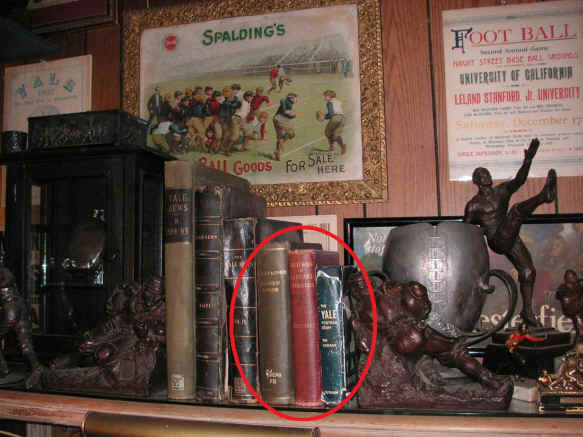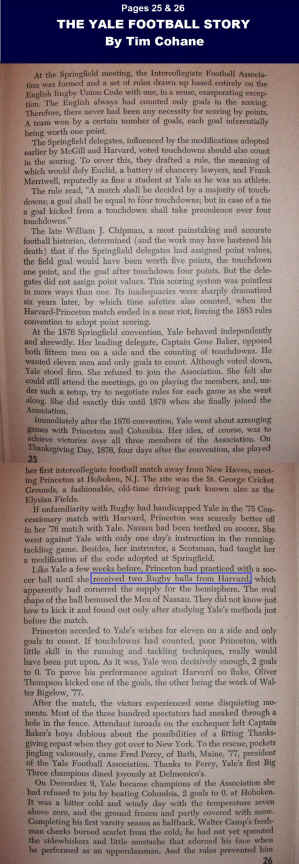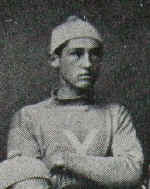|
I've
assembled a fair early football
research library over the years; so I thought
I'd try to read up on the first game
referenced on the engraving between Harvard and the
Montreal Foot Ball Club. No date was indicated
for that game so the only clue was that it
took place before the later referenced Yale Princeton
game on Thanksgiving day 1876. I
dusted off three cornerstone books I thought
might have something pertinent. 1. The H Book of
Harvard Athletics, copyright 1923. 2. Athletics at
Princeton, copyright 1901, and 3. The
Yale Football Story, copyright 1951.
|
Reference
Works
|
|

|
|
Left,
Athletics at Princeton, 1901
Center,
The H Book of Harvard Athletics, 1923
Right,
The Yale Football Story, 1951
|
I
started with the " H Book of Harvard Athletics".
Which is an extensive tome of Harvard football history and the history of
American football collectively...It is one
of the most valuable tools for researching
American football's beginning. There is
in-depth discussion of many of Harvard's
early football games; beginning in 1827 with
their Frosh-Soph
inter-school matches.
The book
had an itemized list of Harvard's intercollegiate
football games starting in 1872....but there was no game
listed with the Montreal Foot Ball Club which
was made up of McGill University and other
college players from Canada....All the historical
accounts I'd ever read indicated Harvard
played their first Rugby game with McGill
University but I had never heard anything
about Harvard playing a Montreal Foot
Ball Club...I was
baffled and a little irritated it wasn't
easily found in the itemized list since I was anxious
to address the ball and move on
to other relics in the Yale Trophy Room...So I
had to do it the old fashion way...dig. Sure
enough I found an account of the game on page
372.
|
In
the latter part of October of this
year (1875) the Harvard team had
gone to Montreal and played a team
picked from all Canadian colleges
winning by a score of two goals and
two touchdowns to nothing. In this
game Harvard played for the first
time fifteen men on the team, the
number being increased from eleven
at the earliest solicitation of the
Canadians who thus strengthened the
McGill team by adding the best
players from other centers of
learning. This game was played under
rugby rules and with a rugby
ball.
Martin
L. Cate, Harvard Class of 1877
Page
372, The H Book of Harvard Athletics |
This
was no doubt that first game referenced on
our ball. Notice the engraving states
"Representing all Canada". The very ball
we are discussing is addressed in
the last sentence. This game was played under rugby rules and with a rugby ball.
That rugby ball was "thee" ball we
are examining.
See
where the engraving states PRESENTED BY HARVARD TO PRINCETON....notice
the word "PRESENTED"...then notice
the ball was "WON" in the other
two games...That's because Harvard and
Princeton never played each other till
1877....So why didn't they play and why did
Harvard "present" it? Well, I
found some pretty good information on that in my copy of Athletics at
Princeton...Below is an excerpt from that
book which serves as a clarifying reference.
Moreover it provides a rare and very detailed glimpse into
the planning and politics of how, when, and
where football
changed from
Association football (soccer) to rugby in
1875-1876. I apologize for it's lengthiness,
as I post it in full; in order I fully persuade
this pivotal occurrence.
|
Excerpt
from Athletics at Princeton, 1901, Pages
278 & 280
....But the situation demanded more serious consideration than this. J. Potter '77 writes: "In the early fall of 1876 a small number of us began to study the problem and quickly came to the conclusion. ( I ) that the Rugby Union game, all things considered, was better than the Association game in discipline and strategy ; ( 2 ) that it was the only game which the larger colleges could possibly be united, and ( 3 ) that Princeton must lead the way in a movement for a championship union, since her record of victories entitled her to do so. Upon first agitating the matter we were met by determined opposition on the part of a majority of the students and alumni. The staple argument of the conservatives was that Princeton now held the foremost place among the colleges at football, and therefore stood to lose much and gain little by the change. ' Let Yale and Harvard come and take away our championship on our own grounds at our own game, they said. But the larger view gained support and we soon felt strong enough to call a mass meeting of the students to vote upon the question. It was held in the old Geological Hall on November 2, and was a lively "scrimmage" . I remember very well making several vigorous speeches, with noisy demonstrations from both sides, and standing as the target in a bombardment of sarcasm from the conservative and timid, including some recent graduates who essayed to dominate the meeting. As to the eventual adoption of the Rugby rules there was little opposition; the serious question was the advisability of playing under them this year. By a very narrow majority, resolutions were passed inaugurating the reform movement and calling on the colleges to join it. The late W. Earl Dodge, '79 (captain of the victorious '78 team), was appointed with myself as a committee to draft and send out a call to Yale, Harvard and Columbia to attend a meeting for the purpose of forming a football association under modified Rugby Union rules. Favorable
responses were received promptly from the three colleges, and Mr. Dodge and I went to Springfield, Mass. on November 23, as delegates to attend the convention.
" At this time Harvard and Princeton were upon terms of exceptional
friendliness, while there had been some passing friction with Yale. As a consequence the eight delegates found themselves ranged upon two sides on many questions, Columbia acting throughout with Yale. The method of procedure adopted was to take up seriatim the Rugby Union rules, and to discuss and modify them with the purpose of creating a more orderly and systematic game, with stricter penalties for foul, umpired by independent officials, instead of, by the captains. Many difficult situations arose requiring tact and good temper, in which Mr. Dodge and myself, as representing the college responsible for the convention and most determined to realize it's objects, endeavored to harmonize the factions and bring about definite results. On most matters Yale, like the conservative element at Princeton, stood by the traditions of the old Association game-for twenty men on a team, for a method of scoring, in which goals only should count, etc. Harvard stood for a score by touchdowns alone. Fifteen men were
finally decided upon as the strength of a team (soon reduced to eleven in 1880), and the score was determined by touchdowns, a goal counting for four touchdowns. Many changes were made in the Rugby Union rules, and that these were wise seems to be indicated by the fact that further changes and modifications, due to the experiences of latter years, have been largely in the same direction. "
In anticipation of the results of the convention
a game under the new Rugby rules had been agreed upon with Yale for Thanksgiving
Day. Thru the courtesy of Harvard the game with them was postponed until the spring of 1877, when after some practice, Princeton might meet Harvard under more equal
terms. Yale had begun practice under Rugby rules early in the fall, and had canceled her schedule of Association games. The position of Princeton as holders of the championship did not permit of such a course, and they faithfully fulfilled their entire schedule of games with all challenging colleges up to the end of the season, winning the championship without loss of a goal.
Pages
278 & 280, Athletics at
Princeton,1901 |
By
the above excerpts we see reference  to the
last game on the engraved plate, plus
confirmation Harvard didn't play Princeton
until the spring of 1877...and why. Moreover we
see that Harvard and Princeton were on exceptionally
friendly terms during this period and that
Princeton had not even played by the new
Rugby rules and needed time to practice them
before taking anyone on. It's not said but I
speculate Harvard gave or
"presented" the ball to Princeton
just like the engraved plate says; most
likely out of
good will between them, as well as for a more practical
reason.... Probably Princeton simply needed a rugby
ball...they had been playing the old
Association (soccer) game, (and continued
playing it the remainder of 1875)..and they
probably didn't have a rugby ball to play or
practice with....Which of course is consistent with
the engraved plaque. I'll
endeavor to not tire readership much more,
however if you click the photo on the right
you will receive further confirmation on the
balls history, even that Harvard bestowed not
one but two rugby balls to Princeton. to the
last game on the engraved plate, plus
confirmation Harvard didn't play Princeton
until the spring of 1877...and why. Moreover we
see that Harvard and Princeton were on exceptionally
friendly terms during this period and that
Princeton had not even played by the new
Rugby rules and needed time to practice them
before taking anyone on. It's not said but I
speculate Harvard gave or
"presented" the ball to Princeton
just like the engraved plate says; most
likely out of
good will between them, as well as for a more practical
reason.... Probably Princeton simply needed a rugby
ball...they had been playing the old
Association (soccer) game, (and continued
playing it the remainder of 1875)..and they
probably didn't have a rugby ball to play or
practice with....Which of course is consistent with
the engraved plaque. I'll
endeavor to not tire readership much more,
however if you click the photo on the right
you will receive further confirmation on the
balls history, even that Harvard bestowed not
one but two rugby balls to Princeton.
 What
started out as casual research brought to
light, what I feel, may be the single most historically
important American football memorabilia
extant. Not only is it from the game's birth
timeline; I point out Walter Camp the Father
of American Football played with this ball in
the 1876 Yale Princeton game his rookie year. What
started out as casual research brought to
light, what I feel, may be the single most historically
important American football memorabilia
extant. Not only is it from the game's birth
timeline; I point out Walter Camp the Father
of American Football played with this ball in
the 1876 Yale Princeton game his rookie year.
Continue
to part 4
|